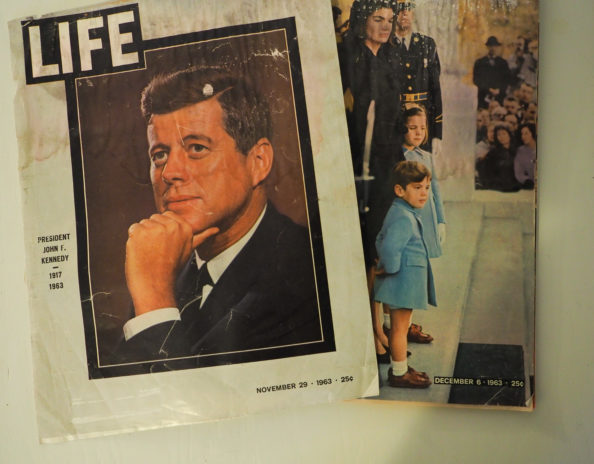Getting to Know RTB Scholar Ken Samples
Having been an author, professor, Sunday school teacher, and radio talk show host over my thirty-five-year professional career, I’ve been asked thousands of questions about all things relating to Christian apologetics and worldview.
I recently sat down with my friend and RTB colleague Joe Aguirre for an interview. We decided to cover some of the questions we often ask scholars who appear on our Straight Thinking podcast. I hope you benefit from my responses.
Our One-on-One
Joe: As a deeply bookish person, outside of the Bible, what are the two most important books that shaped your Christian theological and apologetics perspective?
Ken: I’ve read thousands of books on Christian theology, philosophy, history, worldview, and apologetics. But two books clearly stand out in my thinking about historic Christianity. Those two are Mere Christianity by C. S. Lewis (1898–1963) and Confessions by St. Augustine (354–430).
Mere Christianity was the first Christian book I ever read and its content and author deeply influenced me. Lewis’s book shaped my thinking about both doctrine and apologetics. Doctrinally, I’ve embraced Lewis’s idea of mere Christianity; namely, that there is a robust part of historic Christian theology that all major branches and denominations of Christendom affirm. Apologetically, I have, in large measure, adopted his abductive apologetics reasoning; namely, that Christianity provides the best explanation of life’s most meaningful realities.
St. Augustine’s Confessions is, outside of Scripture, the greatest book I’ve ever read. It chronicles Augustine’s intellectual, moral, and spiritual pilgrimage from paganism to Christianity. The title Confessions can be understood in three ways: (1) Augustine’s candid and contrite confession of sin; (2) his sincere confession of newfound faith; and (3) his thankful confession of the greatness of God. When I read Confessions I often think he’s writing about my own disordered life.
Joe: Who is your favorite Christian thinker from the past and why?
Ken: That’s a difficult question to answer because many of historic Christianity’s thinkers and writers speak to me in powerful ways. But my big three, so to speak, include Augustine, Pascal, and Lewis, with Athanasius not far behind. If I had to pick one it would be Augustine. He is arguably the most influential Christian thinker outside the New Testament authors, especially in Western Christendom. History knows him as a theologian, philosopher, church bishop, and gifted and tenacious defender of orthodox Christianity. To read about nine of my favorites from Christian history, see my book Classic Christian Thinkers: An Introduction.
Joe: Did you have a critical mentor in the developmental period of your faith? If so, who?
Ken: I did indeed have an important mentor in my early days as a Christian. It was the original Bible Answer Man, Walter Martin (1928–1989). Martin was a theologian, philosopher, and the father of the countercult apologetics movement within evangelicalism that first arose in the late 1950s and early 1960s. I attended Martin’s popular Bible class in Southern California for a number of years and later worked with him at the Christian Research Institute (CRI). I wrote about my inspirational mentor and former boss in the article Christian Thinkers 101: A Crash Course on Walter Martin.
Joe: What do you consider to be your life’s verse from Scripture and why?
Ken: There are two Scripture passages that stand out as something like life verses for me. The first is Romans 8:28: “And we know that in all things God works for the good of those who love him, who have been called according to his purpose.”
My wife Joan and I had this passage placed on our wedding invitations some 40 years ago. It’s deeply comforting to know that God in his providential power and wisdom is working behind the scenes of our lives to work all things for good. This is especially important to me when it comes to the big challenges of life, which inevitably involve suffering. This verse tells me I can count on the Lord even when I experience the storms of life.
The second passage is Matthew 11:28: “Come to me, all you who are weary and burdened, and I will give you rest.”
In my youth, I searched restlessly for something that would give my life enduring meaning, purpose, and fulfillment. I initially thought that maybe becoming a rich and famous professional athlete or meeting the right woman would satisfy my existential longings. Yet I later discovered that I was created to know and love God and that true rest and peace for my soul could only be found in communing with the Lord. The struggles of life and disordered choices can make life difficult to navigate. But the Savior Jesus Christ offers broken, weary, and burdened sinners like me the rest and peace we so desperately need and seek. This is a verse that continues to speak to me daily.
Joe: What argument, fact, or piece of evidence do you view as being the most probative in support of the truth of Christianity?
Ken: There are many different arguments and evidences that I think are cogent in supporting the truth of God’s existence and of historic Christianity. However, I like the following approach because I think it’s both reasonable and understandable to others.
My fundamental reason for accepting historic Christianity as true rests on Christian theism’s worldview explanatory power and scope. The historic Christian worldview accounts for an array of realities in nature and in human experience, including the universe; abstract entities; ethics; human beings; and religious phenomena, especially the unique character, claims, and credentials of Jesus Christ.
Joe: What is the greatest challenge to your faith as a Christian?
Ken: I view the many-splintered problem of evil as a challenge to all the major worldviews and that includes my own. Yet while I think the Christian world-and-life view has viable answers to the challenges of both moral evil (malevolent things done by a personal agent; for example, murder, rape, robbery) and natural evil (pain, suffering, and destruction that result from natural disasters), there are still times where I’m emotionally bothered by suffering. The suffering of small children especially troubles me.
Joe: In your role as a Christian apologist, what’s the greatest temptation you face?
Ken: I wrestle with a lot of sins. Thus I’m truly grateful for my Savior Jesus Christ. But in the role of a Christian scholar, I would say the sins that plague me most are envy and pride. When I was a young man I envied my friends who signed professional baseball contracts because it never happened for me. Now I tend to envy my Christian apologist friends whose books sell a lot better than mine.
Pride is a great sin. Some have even referred to it as spiritual cancer because it’s an anti-God state of mind. Sometimes I struggle with a “humble” pride, meaning I’m actually insecure and need other people’s approval. At other times it seems that diabolical pride is lurking at the door. Conversely, humility is a great virtue but hard to hold on to. Having regular times where I read Scripture, pray, resist sin, and confess my sins to God is how I try to respond to these spiritually oriented temptations. Discussing them with my pastor and spiritual advisor also helps keep me accountable.
Joe: If you could do it over again, what would you do differently specifically in preparing to be a Christian scholar and apologist?
Ken: In terms of scholarship preparation, I would focus on developing the four language arts: reading, writing, speaking, and listening. I would also commit myself to the study of logic and critical thinking. Lastly, I would especially dedicate myself to the study of Scripture and to the great classics of historic Christianity.
Joe: What role does aesthetics play in your life?
Ken: I’m passionate about the arts. I especially appreciate paintings and the art forms found in historic Christendom. I also enjoy reading classical literature. My favorite popular musical artist is English musician and songwriter Steve Winwood, whose genre of music includes blue-eyed soul, rhythm and blues, blues rock, pop rock, and jazz.
Joe: Do you have a favorite sport or sports team?
Ken: Baseball is my favorite sport followed closely by basketball. I love how baseball is closely connected with American history. It dates to the Civil War and its golden age was during the Great Depression and World War II. I’ve been an avid Dodgers and Lakers fan for over 50 years. My two favorite sports stars are baseball player Ted Williams and basketball player Jerry West.
Joe: Thanks for the interview, Ken.
Ken: You’re welcome. Peace be with you, Joe.
Reflections: Your Turn
What part of the interview did you find most interesting? Visit Reflections to comment.
Resources
- I write about aspects of my life in my books A World of Difference and Christianity Cross-Examined.






